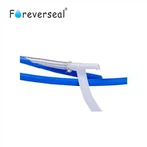Can the Teflon tape used on water pipes be used to seal gas fittings?
You are working on a project at home to connect a new gas grill in your outdoor kitchen near your pool. As you think about connecting the grill to the natural gas supply line, you wonder, "Can Teflon tape be used on gas fittings?
Teflon tape can work wonders for those little projects around your home, and you remember having some tape left over from installing a new shower head in your master bathroom. But it is important to use the right tools. If you are connecting gas pipes and their fittings to your outdoor grill or indoor stove, you should make sure you use the right Teflon tape. Teflon tape is used to seal the threads on gas fittings and prevent leaks at those connections. There is also a type of Teflon tape designed specifically for water pipes that helps prevent leaks at connections to showers, water heaters, refrigerator water lines, and other items.

So, the answer to your question, "Can Teflon tape be used on gas fittings?" is yes, but only with the right type designed specifically for gas fittings. This type of Teflon tape can be found at hardware stores, home improvement stores, and plumbing supply stores.
Is your gas system giving you trouble?
After making sure you are using the right Teflon tape for your gas fittings, it is vital to regularly inspect and maintain your gas system. Even a minor gas leak can pose a significant risk to your home and family. If you smell gas or suspect a leak, be sure to shut off the gas supply immediately and call a professional. Remember, while DIY projects can be satisfying and cost-effective, safety should always be your top priority. Make sure you have the right knowledge and tools before you begin any gas-related project.
Which type of Teflon tape is best for gas fittings?
The right type of Teflon tape for gas fittings is yellow in color and is labeled on the packaging as being made specifically for gas pipes and connecting gas lines. This tape is called gas-grade Teflon tape. It is designed for use on all gas lines, including natural gas, propane, and butane. Teflon tape for gas lines is thicker and can be easily cut with a knife or scissors. It is specially made to withstand temperatures up to 550 degrees Fahrenheit and as low as minus 450 degrees.
Which type of Teflon tape is best for water pipes?
The difference between plumbers' Teflon tape for water pipes and gas pipes is that the tape for water pipes is thinner and white in color. While this tape works well on water pipes to prevent leaks, plumbers' Teflon tape for water pipe connections does not work as well on gas pipe fittings. Over time, thinner tapes can degrade on gas lines and steam can leak out of the joints. This can create a dangerous situation in your home and may lead to an unexpected explosion or other dangerous consequences. That's why it's important to choose the right Teflon tape for gas fittings.
How to Use Teflon Tape on Gas Fittings
There are many more answers to the question, can Teflon tape be used on gas fittings? You also have to make sure that you use the right tape in the right way. When applying gas-grade Teflon tape to gas fittings, make sure that the tape is only applied to the threads of the fitting. You should not apply the tape to the nuts and bolts used to connect gas lines, or to gas compression fittings. Gas fittings are located at the end of the gas line, and unlike gas compression fittings, they are not removable. Before working on a gas connection, always turn off the gas supply to your home. You can turn it off at the gas meter outside your home.
How to Check for Gas Leaks at a Connection
After applying gas-specific Teflon tape to the fitting threads, connect the two gas lines and turn the gas back on at home. You can now check the gas lines for leaks. An easy home method to check for gas leaks is to use dishwashing liquid and water. Mix a few teaspoons of dishwashing liquid with a cup of water in a bowl. Use a rag to apply the soapy water to the gas line connection. Check this connection for bubbles forming. If bubbles appear, this indicates a gas leak. If you are unable to properly tighten the connection to stop the leak, be sure to call a professional who has experience working with gas to properly seal the connection.










